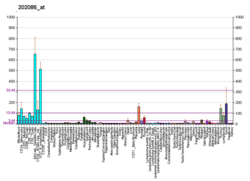| MX1 | |||||||||||||||||||||||||||||||||||||||||||||||||||
|---|---|---|---|---|---|---|---|---|---|---|---|---|---|---|---|---|---|---|---|---|---|---|---|---|---|---|---|---|---|---|---|---|---|---|---|---|---|---|---|---|---|---|---|---|---|---|---|---|---|---|---|
| |||||||||||||||||||||||||||||||||||||||||||||||||||
| Identifiers | |||||||||||||||||||||||||||||||||||||||||||||||||||
| Aliases | MX1 , IFI-78K, IFI78, MX, MxA, MX dynamin like GTPase 1, lncMX1-215 | ||||||||||||||||||||||||||||||||||||||||||||||||||
| External IDs | OMIM: 147150; MGI: 97244; HomoloGene: 1844; GeneCards: MX1; OMA:MX1 - orthologs | ||||||||||||||||||||||||||||||||||||||||||||||||||
| |||||||||||||||||||||||||||||||||||||||||||||||||||
| |||||||||||||||||||||||||||||||||||||||||||||||||||
| |||||||||||||||||||||||||||||||||||||||||||||||||||
| |||||||||||||||||||||||||||||||||||||||||||||||||||
| Wikidata | |||||||||||||||||||||||||||||||||||||||||||||||||||
| |||||||||||||||||||||||||||||||||||||||||||||||||||
Interferon-induced GTP-binding protein Mx1 is a protein that in humans is encoded by the MX1 gene. [5] [6]
In mice, the interferon-inducible Mx protein is responsible for a specific antiviral state against influenza virus infection. Furthermore, the human orthologue MxA is a major host determinant for influenza viruses of animal origin. [7] The protein encoded by this gene is similar to the mouse protein as determined by its antigenic relatedness, induction conditions, physicochemical properties, and amino acid analysis. This cytoplasmic protein is a member of both the dynamin superfamily and the family of large GTPases. [6]




